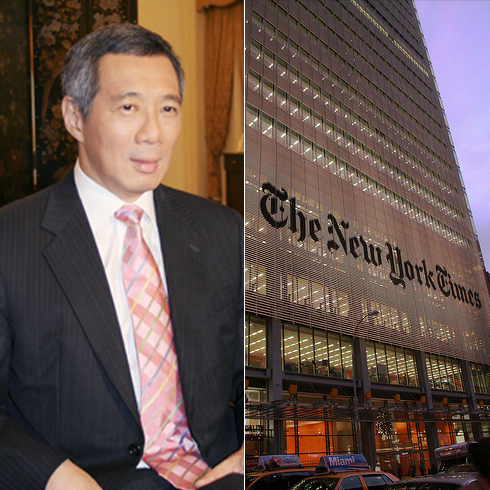Readers of the New York Times last week may have noticed an unusual “apology” issued by the paper to the government of Singapore. It read:
In 1994, Philip Bowring, a contributor to the International Herald Tribune’s op-ed page, agreed as part of an undertaking with the leaders of the government of Singapore that he would not say or imply that Prime Minister Lee Hsien Loong had attained his position through nepotism practiced by his father Lee Kuan Yew. In a February 15, 2010, article, Mr. Bowring nonetheless included these two men in a list of Asian political dynasties, which may have been understood by readers to infer that the younger Mr. Lee did not achieve his position through merit. We wish to state clearly that this inference was not intended. We apologize to Prime Minister Lee Hsien Loong, Minister Mentor Lee Kuan Yew and former Prime Minister Goh Chok Tong for any distress or embarrassment caused by any breach of the undertaking and the article.
Huh? If the Times made an error, readers might have wondered, why not issue a conventional correction? Why the apology, which still leaves the facts of the issue unclear? And what’s up with this “agreement”?
It turns out that the roots of the controversy lie in a 1994 article written by Bowring for the IHT, which is owned by the New York Times Company, entitled “The Claims about Asian Values Don’t Usually Bear Scrutiny.” That story contained the line: “Dynastic politics is evident in “Communist” China already, as in Singapore, despite official commitments to bureaucratic meritocracy.”
As Davinder Singh, a lawyer for the Singapore leaders explained to Reuters last week, the IHT had at the time agreed to pay damages to the three Singapore leaders, who charged that the story was defamatory. According to Singh, the IHT and Bowring had also agreed not to repeat the allegations. But the Singapore government had determined that the recent article violated the agreement. Hence the apology — as well as another payment of damages, totaling $114,000 to the three leaders.
The 1994 story currently appears on the Times‘s website with the following note attached:
[ATTENTION ALL IHT STAFF :The Singapore courts have ruled that material contained in the following article represents libel. Do not provide copies of this story to anyone not employed by the IHT without consulting the Publisher’s office. Do not use information from this article in text being prepared for publication without consulting the Executive Editor.]
The upshot has advocates of press freedom deeply concerned. In an open letter to the Singapore prime minister sent last week, Jean-Francois Julliard, the head of Reporters Without Borders, noted several other cases in which foreign news outlets have agreed to pay damages to the Singapore government after publishing articles deemed libelous. “You have perpetuated your father’s legacy by continuing to harass and intimidate news media,” wrote Julliard. “As a result, aside from a few websites specialising in Singapore, no news outlet can publish independent news and information about issues affecting the political situation in your country.”
Vincent Brossel, an Asia specialist for Reporters Without Borders, told TPMmuckraker that the government in Singapore has an outsized influence in the country’s court system. As a result, said Brossel, “when they make a defamation case, they are sure to win.”
That means that if the Times Company hadn’t agreed to the settlement and had gone to trial, it could have ultimately have been forced to pay a much larger sum. And if it refused, it could be putting any employees in the country in jeopardy of jail-time, and would risk no longer being able to do business of any kind in Singapore, including distributing the IHT. It’s not clear how much that might cost the Times Company, but Singapore is a business hub for Asia, and Brossel described it as a “significant country.”
A spokeswoman for the New York Times Company did not respond to two requests for comment. Bowring declined to comment.
Late Update: The Times declines to comment.






